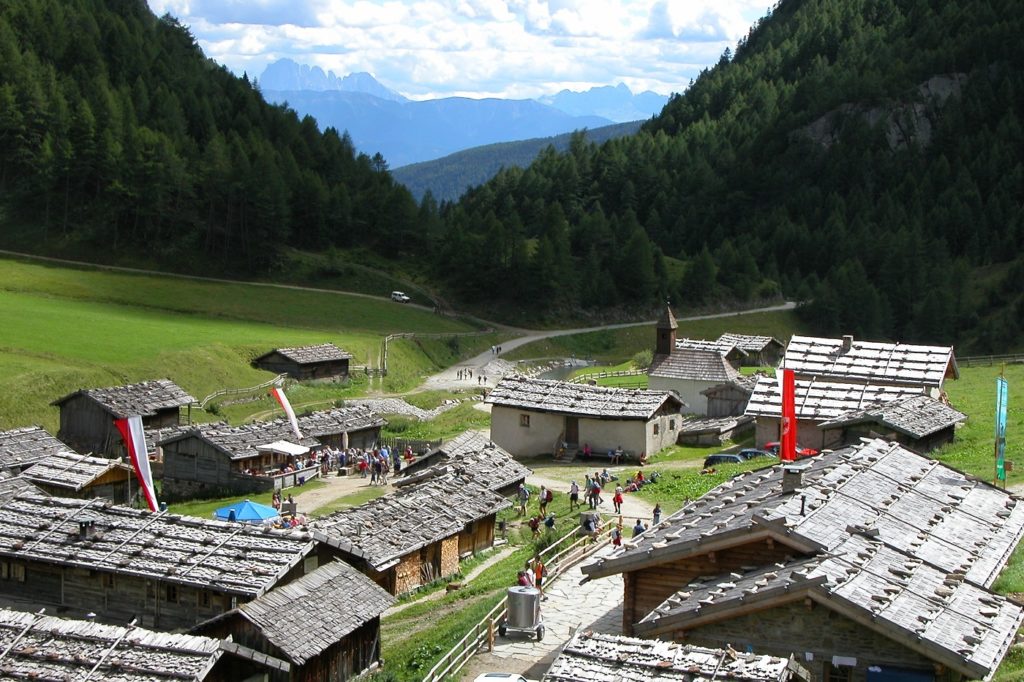Early in 2020, I was instructed in the art of radical hospitality by a woman whose parents had demonstrated to her how to love one’s enemies. During my COVID-shortened semester abroad, five friends and I hopped a plane, trains, and an automobile to visit Sankt Radegund, Austria, home of Blessed Franz Jägerstätter, a brave soul who dissented amid social pressure and refused to swear allegiance to Adolf Hitler, paying for it with his life. Maria, nearly eighty years old and the second daughter of Franz and his wife Franziska, offered to fetch six American college kids, whose German skills ended at “guten Tag,” at the train station half an hour away. She and her friend Elisabeth, who had driven an additional three hours from Linz to assist, welcomed us as we stepped off the train.
Maria’s father’s story inspired A Hidden Life, Terrence Malick’s masterly 2019 film that poignantly showcases the deep Christian devotion of the Jägerstätters and the beauty of redemptive suffering. Franz Jägerstätter’s life was one of inspired insanity. Born in 1907 to an unwed maidservant, Franz led a colorful youth. He was a bright, avid reader, yet was equally fascinated by girls and motorbikes. He left Sankt Radegund to find work, lost his faith, returned, and fathered a child out of wedlock. He wanted to marry the woman, but his mother advised against it. (Franz remained devoted to the little girl until his death.) Following these events, he regained direction and relocated his faith. Indeed, Franz sought to enter the monastic life in 1934, but his priest recommended he fulfill his responsibility to his declining mother and family farm. As Franz contemplated his vocation, so did Franziska Schwaninger, a devout young woman who grew up nearby and was considering entering the convent.
After treating us to farm-fresh duck and dumplings, Maria and Elisabeth ferried us between the foothills to key places from Maria’s parents’ life. From the train station, we drove through snowy pines, past Franz and Franziska’s childhood homes, and stopped at the inn where Franz and Franziska met at a social gathering. We meandered up to the highest point in the surrounding area, overlooking the Salz river, the border between Austria and Germany. When Franz was young, Maria told us, he jumped in the freezing water and swam to the other side just to prove a point to his friends, perhaps an early sign of her father’s fearless and determined spirit. Our final stop was Sankt Radegund. We first arrived at the small, whitewashed parish where once Franz was sacristan, but which now serves as his burial place and shrine. Only a few minutes away was Franz and Franziska’s simple farmhouse, now converted into a museum.
Franz and Franziska quickly fell in love, marrying in 1936 and venturing on an unconventional honeymoon—a pilgrimage to Rome. Marriage proved a turning point for Franz. He followed Franziska to the sacraments and consistent theological study. Franziska was responsible for shaping Franz into an entirely different man. However, the effect of grace on their marriage was hardly stoic; they played silly games with one another and penned lengthy, tender letters during times apart. In one of these, Franz wrote, “I could never have imagined that being married could be so wonderful.” Three small daughters, including Maria, joined their family over the next few years.
Start your day with Public Discourse
Sign up and get our daily essays sent straight to your inbox.While the Jägerstätter family flourished, their little community, a stone’s throw away from Bavaria, was becoming nazified. Austrian church leaders pushed back, only to witness the surging popular approval of their new German overlords. The clergy chose between navigating the new status quo and suffering Nazi persecution.
Franz dreamed of a train swarmed by a crowd, everyone fighting for a place on board. A voice in his dream proclaimed, “This train is going to hell,” and gently tugged him away. Franz eventually understood the train as an allegory for the creeping influence of the Nazis, which could only bring one’s soul to utter destruction.
From the outset, Franz was wary of Nazi suppression of the Church and studiously considered whether the two could be compatible. In 1938, when the Austrian people affirmed Germany’s annexation of their country, Franz dreamed of a train swarmed by a crowd, everyone fighting for a place on board. A voice in his dream proclaimed, “This train is going to hell,” and gently tugged him away. Franz eventually understood the train as an allegory for the creeping influence of the Nazis, which could only bring one’s soul to utter destruction. He wrote, “I want to call out to each person who’s sitting in the train: ‘Jump out before this train reaches the end of the line, even if it costs you your life!’”
After Franz’s solitary vote against the Nazis, his community badgered him to reconsider. No one, including his wife and the bishop of Linz, understood his position. He was drafted into the army and called up several times over the next few years, yet he managed to avoid deployment. In 1941, Franz returned to Sankt Radegund, determined never to serve again. Devotion to his eternal homeland increased; he became a lay Franciscan and the sacristan of his parish. He wrote extensively about his conviction, touching on conscience, authority, obedience, and responsibility. He perceived a clear connection between his own predicament and that of Christ. Franz compared Austria’s acquiescent citizens to the crowd in first-century Jerusalem, who “were given the freedom to choose between the innocent redeemer and the criminal Barabbas,” and were intimidated into submission by the Pharisees or ostracized as fools if they resisted.
Franz’s interlude had an expiration date. In early 1943, he was conscripted despite his civilian exemption. He requested service as a medic or to fight without weapons but was denied. Upon refusing to take the oath to Hitler required of all soldiers, he was interrogated and imprisoned. While he was incarcerated, fellow prisoners attested to his unshakable religious resolve and spirit of encouragement. Critics accused him of forfeiting his family’s good and rebelling against the Nazi cause in vain. Yet letters from prison to his wife and daughters are devoid of complaints or despair, instead offering rich reflections on suffering and conscience. Franz wrote to his wife, “I wanted . . . to spare you from all this suffering. . . . [H]owever Christ said, ‘He that loves father, mother, wife and children more than me is not worthy of Me.’” Franziska supported her husband, although she failed to understand him fully and wondered if he still might serve in some capacity, thus saving his life and their family’s future.
In one of his final letters, Franz wrote, “the most important thing is only that the Lord may not let me go to ruin for eternity.” On August 9, 1943, Franz was beheaded.
It was not to be. In July 1943, Franz received a sentence of death from Berlin for the crime of “undermining military morale.” Franziska and their priest were permitted a final short visit to Franz in an attempt to sway his resolve. Like Christ, however, Franz’s commitment to following his conscience and eternal Father was unwavering. In one of his final letters, Franz wrote, “the most important thing is only that the Lord may not let me go to ruin for eternity.” On August 9, 1943, Franz was beheaded.
Even after Franz’s death and the end of the war, his family remained ostracized and his life was regarded by their community as a waste. Franziska was refused government pensions for decades due to the nature of Franz’s death, and thus bore the responsibility of her family’s livelihood, including the labor of farming. However, as Elisabeth attested in person, Franziska was never bitter. Even in the midst of her loss, she extended kindness to those who hated her. Multiple neighbors recall how Franz and Franziska generously fed and clothed them, even during their own tough times.
The warmth of the Jägerstätters’ joy and generosity was palpable. After our stop at their farmhouse, Maria invited us to her own home for coffee. Maria made four rounds with different Austrian pastries, insisting we take more. We sat with the two women for hours, asking questions about their family. Although Maria lamented having few memories of her father, she spoke of him proudly and laughed about asking for his intercession in the minutiae of finding her keys. Elisabeth reflected on the times she had sat at the same table with Franziska. “We like to joke around that Franziska was the real saint here,” she told us. Humor aside, Maria quietly hopes to see her parents canonized together. In Maria’s dining room hung a photo of Franziska’s face at her husband’s beatification, radiant.
To work off our pastries, we ventured out to the spot on Franz and Franziska’s farm where a modest monument in commemoration of Franz’s life now stands—marking his birth, death, and the date of his beatification at the Cathedral in Linz (2007). Elisabeth expressed how grateful she and Maria were to share the Jägerstätters’ story and led us in a few quiet prayers.
Norms of spite and ad hominem attacks saturate our discourse, and uncivil behavior is lauded. The spoken or posted word may school our opponents and leave us feeling satisfied, but examples of reconciliation and grace would prove far more healing.
Then, giving us each an English copy of Franz’s biography, they drove us back to the train station well after dark, waving goodbye as our train rolled south toward Salzburg, the well-known home of Georg von Trapp and a very different conclusion to defying Nazi conscription. One leaned on his means and fled with his family; the other could not. Hospitality toward strangers was a remarkable testament to the spirit of the Jägerstätters, an unrelenting pursuit of truth unmarred by any trace of hostility. “Embrace your enemies” is Franz’s epitaph, engraved over the doors of his parish.
This hidden life speaks loudly in our antagonistic era. A prison reflection of Franz remains pertinent eighty years later: “It’s said that words instruct, but examples inspire us to follow. Do we not want to see Christians who, in the midst of all the darkness, are still able to stand above it all in clarity, calmness, and confidence, who, in the midst of all the lack of peace and joy, the egoism and hate, still stand there in the purest peace and cheerfulness?” Norms of spite and ad hominem attacks saturate our discourse, and uncivil behavior is lauded. The spoken or posted word may school our opponents and leave us feeling satisfied, but examples of reconciliation and grace would prove far more healing as Americans approach a new administration on the heels of a contested election. Sanctity emerges in the small and hidden acts of sacrifice. Franz put it best: “It’s possible, with God’s help, for us to work our way out of the swamp in which we’re stuck, and to attain eternal bliss.”














